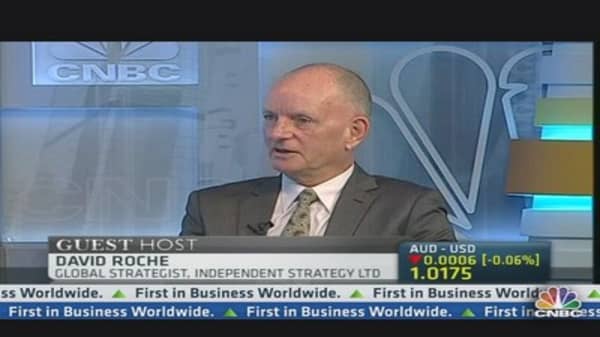The bond markets will crash once global central banks stop buying debt, triggering a financial crisis much worse than the one seen in 2008, strategist David Roche told CNBC.
Roche, who has previously warned that "safe haven" government bonds are the most dangerous place for investors to be in, said Wednesday: "Yes it [a financial crisis] will happen and yes, it will be bigger [than the credit crisis]. Once you re-price the burden of the world's debt... the ugly truth will be revealed."
(Read More: The Most 'Dangerous' Asset to Own Is...)
According to Roche, president of Independent Strategy, once the expansive quantitative easing programs initiated by Western central banks come to an end, sovereign bond yields, including U.S. Treasurys, German Bunds and U.K. Gilts, will spike significantly prompting a crash.
Yields on U.S. 10-year Treasurys have fallen more than 200 basis points over the past five years and are now around 1.8 percent. Meanwhile, U.K. 10-year Gilts and German 10-year Bunds were also trading near record lows on Wednesday at 1.8 percent and 1.29 percent, respectively.
"As long as the central bankers print money, the only way to have to distribute it is [for governments] to buy 70 percent of new bond issuance in these safe haven bond markets. As long as they go on doing that, the yields won't go up, and the day they stop, the yields will go up by so much we will have a financial crisis on our hands," he said.
Roche said the impact of a crash in the "safe haven" bond markets will be catastrophic for financial markets worldwide.
(Read More: Should Bond Investors Brace for a 1994-Style Crash?)
"You are looking at a massive capital loss on a mark-to-market basis for a lot of financial institutions in the world and for people who have put their savings into those bonds, which will hit demand and hit the real economy, because if wealth goes down people's optimism about the world economy will fade," he added.
In recent years, major western economies have embarked on expansive bond buying programs in attempt to prop up flagging growth following the credit crisis. But speculation over whether the U.S. Federal Reserve will end its expansive bond buying program, has risen this year. In the Fed's latest minutes, it emerged that several committee members were concerned over the risks of continuing its asset purchases for too long.
The end of QE has prompted concerns over how markets will cope unsupported.
(Read More: Will the Federal Reserve End QE This Year?)





